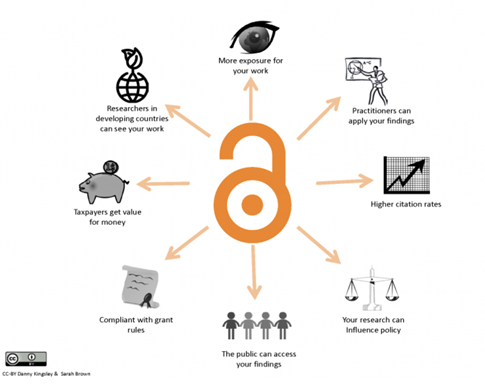Open Access means free and barrier-free access to scientific knowledge. It is a movement that was born within the academic world whose aim is to regain ownership of scientific communication by offering free access to documents and making it possible to circulate and share research results.
Over the past 20 years, there has been an exponential increase in the price of subscriptions to scientific periodicals, while libraries and research institutions have seen their budgets shrink, making the paradox of the scientific publishing supply chain stand out even more:
- universities, research organisations and funding bodies invest resources in research;
- research staff produce scientific articles to disseminate the results of their research;
- the articles are published by commercial publishers, who, in exchange for the guarantee of the scientific validation process (peer review, carried out by other researchers, often without compensation or with token remunerations), publish without paying the author;
- institutions are forced to pay again to regain possession of the publishing products of their scientific production.
This prompted the various stakeholders (authors and institutions) to experiment with alternative strategies to traditional publishing.
Publishing in Open Access has many advantages and benefits:
- for authors and researchers who, thanks to the increased visibility of their work, achieve immediate dissemination of research results, greater impact and increased citations. They also have the opportunity to experiment with new forms of peer-review and evaluation metrics alternative to the Impact Factor;
- for the University, which can count on greater visibility for its research staff in the international area;
- for society since, through increased circulation and sharing of knowledge, Open Access offers the possibility for everyone, even those who cannot pay, to access research products and contribute to the advancement of knowledge.
An institutional repository is a platform where members of the academic community deposit documents, in electronic format, resulting from the University’s teaching and research activities.

There are many advantages to the institutional repository:
- Visibility - open access to the university’s scientific production makes the scientific activity of the institution and individual authors visible;
- citation indices increase - the indexing of articles archived in institutional repositories by search engines increases the visibility and searchability of articles by increasing citation indices. Recent studies show that web-searchability of articles has a direct influence on Impact Factor and H-Index;
- cost savings - the ability to access publications produced by the academic community without necessarily having to subscribe to the journal in which they are published.
“In the principles and tools of Open Science the Politecnico di Torino sees an opportunity for growth for the University’s research, with important spin-offs in the field of education and its broader cultural mission. In terms of research, the Politecnico intends to give a strong impulse to the culture and practice of Open Science by its academic community, starting with the definition of policies to promote, raise awareness and support the openness of scientific publications, data and software”.
from the University’s Open Access Policy
Open Access Policy
The Politecnico embraces the principles of open access to scientific literature and promotes the free dissemination of research results produced at the University:
By Rector’s Decree No. 87 of 15 February 2019, the University Policy on Open Access to scientific publications was issued and came into force on 1 June 2019.
Porto@Iris Repository
Porto@Iris is the institutional archive of the Politecnico di Torino that collects the publications produced by the university’s scientific community.
Porto@Iris enables the self-archiving of bibliographic data and publication annexes, guaranteeing their preservation and perpetual access.
The storage of products in Porto@Iris enables the fulfilment of MIUR career and evaluation requirements (VQR, ASN and internal evaluations) and Open Access requirements for European and national projects.
Publications relating to research carried out under the Horizon Europe and Horizon 2020 programmes on Porto@Iris, are automatically collected and deposited (avoiding double data entry) in OpenAire, the repository created by the European Commission that collects the list of all publications carried out within the Horizon Europe and H2020 programmes.